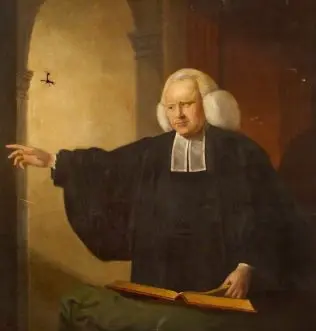George Whitefield was born on December 27, 1714, in Gloucester, England. In 1732, he started his studies at Pembroke College, Oxford. While there, he joined the Holy Club, a small group of students focused on religious devotion, where he met the famous John and Charles Wesley. When the Wesley brothers left for Georgia in 1735, Whitefield stepped up to lead the group.
Before university, Whitefield worked in his family’s inn and loved drama.
After earning his BA in 1736, Whitefield was ordained as a minister in the Church of England. Instead of taking charge of a parish, he devoted himself to be an itinerant preacher and evangelist, and was well known for his extremely dramatic sermon performances. In 1740, Whitefield founded an orphanage in Savannah, Georgia, USA, called Bethesda the oldest continually operating orphanage in America.

Whitefield worked with John and Charles Wesley to help launch the Methodist movement. As an Anglican preacher and leader among Calvinistic Methodists, he was a major figure in the Evangelical Revival across Britain, as well as in America’s Great Awakening.
He remained active until his death on September 30, 1770.
“George Whitefield was an English evangelist who was famous on both sides of the ocean. He had made thirteen Atlantic crossings at a time when ocean voyages were not pleasure cruises. He may have been a prophet, or a buffoon, or possibly a blend of both. His voice was fantastic. Benjamin Franklin once stood half a mile away in a crowd he estimated to be thirty thousand and he claimed that he heard Whitefield well. The skeptical Franklin for some reason took a shine to Whitefield, and invited him to lodge above his press shop. He printed his sermons, helped raise funds to build an auditorium for him. Many of the dandified society were charmed by him. The Virginia Gazette of August 24, 1739, said:
"Several fine ladies who used to wear French silks, French hoops of 4 yards wide, Tete de Mouton Heads [wigs] and white Satin Smock-Petticoats are turned Methodists and Followers of Mr. Whitefield. They now wear plain Stuff Gowns, no Hoops."
Not everyone found him enchanting. Dr. Johnson growled: "His popularity, sir, is chiefly owing to the peculiarity of his manner. He would be followed by crowds were he to wear a nightcap in the pulpit or were he to preach from a tree."
Charles Chauncy wrote to George Wishart of Edinburgh: "The grand subject of Conversation was Mr. Whitefield and the whole Business of the Town to run, from Place to Place, to hear him preach." Other clergy feared to lend their pulpits to someone so sensational, so Whitefield preached in the fields, to gigantic crowds. The actor David Garrick was fascinated by Whitefield's dramatic talent, and said that he could make audiences weep or tremble just by varying his pronunciation of the word "Mesopotamia." Garrick slyly added: "His eloquence advanced up to its 40th repetition before it reached its full height."
Whitefield was capable of rather touching self-insight, as in this entry in his Journal: "Alas, Alas. In how many things have I judged and acted wrong. Being fond of scripture language, I have used a style too apostolical and at the same time I have been too bitter in my zeal. Wild-fire has been mixed with it, and I find that I frequently wrote and spoke in my own spirit, when I thought I was writing and speaking by the assistance of the spirit of God." He could also show a nice sense of humor, as in his iniscence about reforming one terrible Scotsman who "used to swear to ease his Stomach." Yet this same man, Whitefield, could turn about and make a preposterous announcement such as, "I will assure you, Moses was a Methodist." He once skirted close to slander when he asserted, "Archbishop Tillotson knew no more about true Christianity than Mahomet." Some clergymen in New Jersey found him unappetizing, and tried to discourage him from putting on revival meetings in their churches. Barred from one pulpit, Whitefield had four cronies lock the resident preacher in a pew box, while Whitefield climbed into his pulpit. Of Whitefield's tour of America in 1740, Thomas Prince remarked that "Boston had never seen anything like it before, except at the time of the general Earthquake."”
Excerpt from Dodds, Elisabeth D. Marriage to a Difficult Man: The Uncommon Union of Jonathan and Sarah Edwards. Chapter 7: “The Awakening: A Dubious Blessing.” Westminster John Knox Press, 1971.